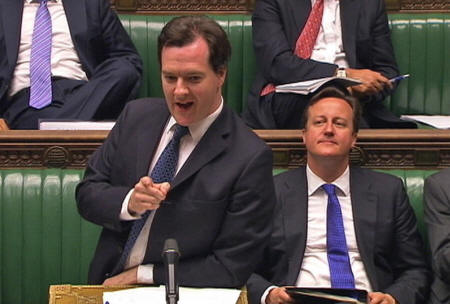|
This year’s annual Bilderberg conference is rapidly approaching - where the world’s political and business elite meet in private to discuss their agenda which will determine future policies that govern global affairs.
Some aspects of this year’s
Bilderberg agenda are gradually coming into
view, and have the potential for directly affecting not only big
multinationals like Google, but every business on the planet.
First came the false start from the alternative media regarding the meeting’s actual location, with many claiming it would be held again at the Westfield Marriot in Chantilly, Virginia.
Two months after, the announcement arrived that the meeting would take place 30 minutes north of London, at the Grove Hotel in Hertfordshire, England, and small media circus is expected the year following the announcement that a ‘Bilderberg Fringe’ festival is being organized adjacent to the venue - an event certain to attract hundreds, if not thousands of revelers, press and alternative media personalities.
Add to this the news that long time Bilderberg sleuth and American Free Press correspondent, Jim Tucker had passed away on April 24th.
Few people would even know the Bilderberg meetings ever took place if not for 30 years of digging and reporting by veteran journalist Tucker.
hosts to Google and Bilderberg summits.
Beyond all the fanfare, however, the central question still remains:
The answer to this question may be hidden in plain site.
Google is currently engaged in a battle over unpaid taxes in the UK, and which has led political commentators to now call for a new system of global taxation. Not surprisingly, this has become the chief topic of discussion at a series of global summits taking place during May and June.
Here’s how this major issue rose out of the Google debate, and how it will be folded into Bilderberg’s 2013 agenda, and later to the G8 Summit shortly thereafter…
Google’s Big Tent - ‘A Digital-Davos’
This past week witnessed another major global conference held at the very same Grove Hotel in Hertfordshire.
The parallels to Bilderberg are striking - they share the same guests, the same venue, observe similar codes on conduct, and no doubt have similar items on their agenda.
Google’s ‘Zeitgeist’ Global Summit, or "Big Tent" event, is effectively the internet’s version of a ‘Digital Davos’, where ‘the best and the brightest’ are invited to hear the latest ‘big ideas’, with debates and keynote speeches from the likes of,
...and other celebrities including Stephen Hawking.
It’s worth pointing out here that both Osborne and Miliband have played the role of Google’s adversary in public during their corporation tax row, yet they are the corporation’s VIP guests in private.
Beyond the high profile talks and entertainment, there were of course, some serious discussion about ‘big ideas’ taking place under the big tent. This year’s event also required participants to observe ‘Chatham House Rules’, meaning key conversations should be held in the strictest of confidence and not be leaked to the outside world.
As with Bilderberg, Google’s Big Tent discusses serious global changes that affect present and future generations - all behind closed doors.
Other persons of note at this year’s Google retreat were,
The profile of Google and Bilderberg guests has seen an incredible overlap in recent years, which is a testament to the corporation’s own stated ambition to achieve a global dominion, not only over its marketplace, but over cultural and political life as well.
The reality in 2013 is that Google is poised to manage nearly every aspect of our lives - our communications, our work, our social life and even our history.
Bilderberg’s Digital Tycoons
As Google’s global summit runs smoothly into Bilderberg this year, so have the two meeting agendas. Recent years have seen an increase in the influx of digital tycoons present at Bilderberg.
Alongside software moguls like,
...the social media kingpins have also moved in to occupy key positions in Bilderberg’s top steering committees.
A key player in amongst them is Peter Thiel (above), head of Clarium Capital, the digital investment house that provided the financial clout which allowed for online ventures like,
...to dominate their digital marketplaces.
Thiel was promoted to Bilderberg committee head in 2011 and has emerged as a key player not only in the online industries, but also as an influencer in US political spheres, gaining attention recently as a prominent backer of Kentucky’s Republican junior Senator Rand Paul.
New global ‘Google Tax’ already in the works
The convergence of the Google Summit, its tax battle, and Bilderberg 2013 may seem innocent enough on its surface, but the timing is no mere coincidence.
UK leadership have whipped up a frenzy in the media over Google’s alleged tax sins, leaving the public clamoring for a solution. The words "never let a good crisis go to waste" certainly chime in well here.
Two weeks ago, a major UK clash erupted between No. 10 Downing Street and Google over the issue of corporate tax evasion.
Google’s Matt Brittin was grilled by the UK’s Commons Public Accounts Committee (PAC) and its chair Margaret Hodge, who accused Google "doing evil" by using an elaborate array of offshore entities in a "smoke and mirrors" financial maze designed to avoid paying any significant tax into UK coffers.
Both PM David Cameron and Chancellor George Osborne also came out loudly in public accusing Google of being ‘immoral’. Google is said to have only chipped in 6 million GBP in 2011 out of its 3 billion GBP turnover in that same year.
Google’s Peter Baron claims its in full compliance with UK law, issuing the public statement last week that,
Will Google throw in the towel and submit to a
British tax resolution?
So it’s doubtful that any British politico could strong-arm Google.
Behind the scenes both Google and Britain’s political elite share a place at central planning’s top round table - as members of the Bilderberg Group and that’s where the really ‘big ideas’ are not just discussed, but actually transmitted into policy.
As the public feud between Google and Downing Street takes centre stage, backstage both UK Chancellor George Osborne and Google CEO Eric Schmidt - both committed fellow Bilderberg members, are said to have met in private at the Google event, and are poised to do so again at Bilderberg 2013.
Both have attended the annual meeting
almost continuously since 2006.
and fellow Bilderberger to Goolge CEO Schmidt in private.
So this apparent Punch ‘n Judy match between Google and Downing Street appears just three weeks before this year’s Bilderberg summit, and four weeks before the G8, and suddenly the UK government and media outlets have become infested with a the new talking point:
While addressing the Google tax loophole, the UK’s Independent newspaper led by its liberal-leaning economics editor Ben Chu, goes on to essentially lay-out what is likely to be at the top of the agenda at Bilderberg 2013:
Global tax means global government
So,
Although happy to float such a revolutionary idea in the media in advance of back-to-back Google and Bilderberg summits at the Grove Hotel, and later at the G8, one thing which global taxation advocates fail to mention here is that if you institute a global taxation system then you would then need a global government to administrate it.
Yes, you heard that right: global taxation =
global government.
UK Column Editor Mike Robinson explains,
History can certainly prove one thing:
Whatever commentators like Ben Chu and others are proposing will obviously be much easier to enforce on small to medium size businesses, as well as individual traders - all of whom have significantly less political leverage (and no invitations to Bilderberg) than the Googles and Facebooks of the world.
Post-Bilderberg - G8 Summit
Following the ratification of Bilderberg’s 2013 agenda in Watford on June 6-9th, the next step is normally to disseminate this same agenda on to the G8 heads of state.
Conveniently, this year’s G8 summit will held June 17-18 at the Lough Erne golf resort in Fermanagh, Northern Ireland.
David Cameron and George Osborne’s new plan for Google is already expected to be very high on the agenda at the (next) G8 meeting, where world leaders including Barack Obama and Vladimir Putin will be in attendance.
Henceforth, ahead of the G8, the UK government is expected to play their key role in promoting the new global tax system, by publically advocating,
Coincidentally, this year’s G8 in Northern
Ireland will be the biggest police operation in country’s history (and
that’s saying a lot), with an estimated 8,000 officers from the surrounding
counties, and from as far as England and Wales, all drafted in to secure the
area for what many now believe has essentially become a global government
operations meeting in all but name.
Other recent attempts at a global tax
The financial component of this global tax and government equation is actually already in place, and that is the World Bank.
The first administrative working model for a global taxation structure was originally unveiled in 2009 at the United Nations Climate Summit in Copenhagen. Delegates at that event floated their plan for a global carbon tax that would be collected and then deposited into a slush fund which was to be administered by the World Bank.
Their plan also entailed the poorer, developing nations footing most of the bill for this operation, while the wealthier nations would receive a free pass. The secret plan was thwarted at the last minute thanks to the infamous Danish Text Leak, which were serialized in the Guardian newspaper at the time.
Although popular in socialist circles, few have dared reveal the true picture of a global tax regime for fear of triggering a public backlash.
Another such tax proposals have been pushed into the public sphere through the Occupy Movement in 2011, with called for a global tax on financial transactions, or a global "Robin Hood Tax".
As was the case in Copenhagen two years earlier, proponents called for a tax structure without borders, yet few dared mention who would be in charge of administering and distributing the revenues.
Such plans pose the very real danger of further centralizing power into the international banking community who would be asked to handle and perhaps hypothecate on these enormous slush funds.
Which brings us back to this latest global ‘google tax’ proposal, which ultimately begs the question:
Serving the global collective
The media and political elite will have the public believe that there are not enough laws and regulations already in place to deal with apparent problems like large multinationals avoiding corporation tax.
The fact is there are regulations in place, and
all that is needed is to tighten them. So why jump ahead to insist a global
tax system is necessary to solve the issue?
This is also the fundamental problem with EU plans to levy new taxes on member nations - for any citizen it’s simply another master to serve. It starts with corporate tax, and once that door is opened, it’s anyone’s guess how wide their new regime will stretch.
Shocking as that may be, these issues are exactly what is being discussed behind closed doors at each of these global summits taking place in May and June of 2013.
What’s worse, is that this entire construct could be ushered in without any vote being cast by any citizen in the individual countries - which is about as undemocratic as it gets.
This remains one of the fundamental flaws at the heart of the ultra-liberal utopian ideal which is global government.
|




